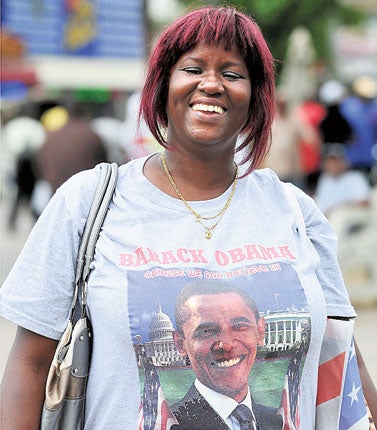Cuba ready to put 'everything' on table in US talks
Castro's offer high on agenda at Summit of the Americas in Trinidad

Your support helps us to tell the story
From reproductive rights to climate change to Big Tech, The Independent is on the ground when the story is developing. Whether it's investigating the financials of Elon Musk's pro-Trump PAC or producing our latest documentary, 'The A Word', which shines a light on the American women fighting for reproductive rights, we know how important it is to parse out the facts from the messaging.
At such a critical moment in US history, we need reporters on the ground. Your donation allows us to keep sending journalists to speak to both sides of the story.
The Independent is trusted by Americans across the entire political spectrum. And unlike many other quality news outlets, we choose not to lock Americans out of our reporting and analysis with paywalls. We believe quality journalism should be available to everyone, paid for by those who can afford it.
Your support makes all the difference.Barack Obama was urged to end the 47-year-old American embargo of Cuba by a phalanx of Latin American and Caribbean leaders at a summit in Trinidad last night.
The pressure on Mr Obama came after Raul Castro, the Cuban leader, insisted that he was ready to discuss "everything" with Washington.
As the summit got under way in Port of Spain, the isolation of Cuba by the US – and what Mr Obama intended to do about it – looked set to dominate proceedings. "There is no more Cold War," proclaimed the Brazilian President, Luiz Inacio Lula da Silva, after speaking with Mr Obama on the issue.
In an attempt to blunt any ambush at the summit, Mr Obama last week took some steps at least to tinker with the fringes of the Cuba embargo. He lifted all restrictions on Cuban-Americans wishing to visit family in Cuba or send money to the island and authorised the US telecommunications industry to bid for contracts there.
"I think what you saw was a show of good faith on the part of the US, that we want to recast our relationship," Mr Obama said of those changes during an eve-of-summit visit to Mexico on Thursday. However, he added that for more to happen Cuba would have to show its willingness to reform.
"There are a range of steps that could be taken on the part of the Cuban government," Mr Obama added. "My guidepost in US-Cuba policy is going to be how can we encourage Cuba to be respectful of the rights of its people."
Cuba's membership of the Organisation of American States was suspended in 1962, and Mr Castro himself was not at the Port of Spain summit. But, within hours of Mr Obama's remarks, Mr Castro, who was attending meetings of leftist leaders in Venezuela, returned the ball with rhetorical challenges of his own.
"We've told the North American government that we are prepared to discuss everything – human rights, freedom of the press, political prisoners – everything, everything, everything," he said. He went on, however, to underline that the Cuba will enter such dialogue only if the US "respects" the right of self-determination for the island.
Others expected to lash the US for its Cuba position included Evo Morales of Bolivia and Hugo Chavez of Venezuela. It hardly helped Mr Obama that the summit coincidentally fell on the anniversary of the 1961 Bay of Pigs invasion, when CIA-backed Cuban exiles were humiliated by the forces of Fidel Castro.
Whatever flirting is now going on between Washington and Havana may quickly be replaced by a more testing reality. Since he took over from his brother, Raul Castro has made few concrete steps towards reform of the island's political system. There have been no multi-party elections, freedom of expression remains almost non-existent and about 200 political prisoners remain behind bars.
And, at home, Mr Obama faces contradictory forces. A bill now sits before the US Congress that envisages ending the ban on travel to Cuba for all American citizens. However, more hardline voices, notably from the Miami area, argue that the President has already gone too far in the absence of any serious sign of liberalisation on Cuba's part.
Lincoln and Mario Diaz-Balart, two congressmen with ties to the Cuban-American lobby, called his decisions this week a "serious mistake". They went on, "We call upon President Obama to not grant any further unilateral concessions to the Cuban dictatorship."
Battle for Bolivia: Plot to kill Morales
Bolivian police foiled an alleged plot to kill President Evo Morales, right, on Thursday, shooting three men in a 30-minute gun battle with a mysterious group that included suspects from Hungary, Ireland and possibly Croatia. Police had attempted to arrest the men in the center of Santa Cruz, but they fled to a hotel where an intense shootout took place around 4am, witnesses and police said AP
Subscribe to Independent Premium to bookmark this article
Want to bookmark your favourite articles and stories to read or reference later? Start your Independent Premium subscription today.
Join our commenting forum
Join thought-provoking conversations, follow other Independent readers and see their replies
Comments